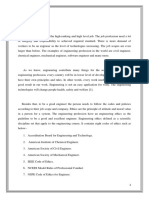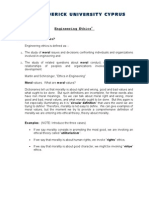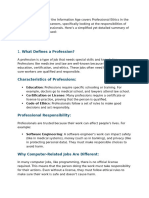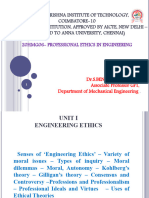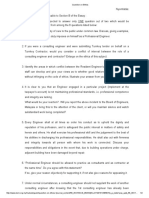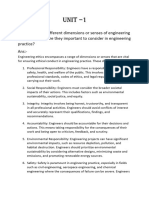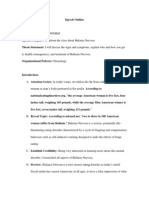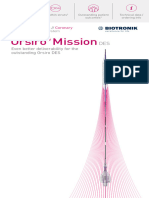ENGG650 Midterm Solution - Spring 2018
ENGG650 Midterm Solution - Spring 2018
Uploaded by
Sayeh Al SayehCopyright:
Available Formats
ENGG650 Midterm Solution - Spring 2018
ENGG650 Midterm Solution - Spring 2018
Uploaded by
Sayeh Al SayehOriginal Description:
Original Title
Copyright
Available Formats
Share this document
Did you find this document useful?
Is this content inappropriate?
Copyright:
Available Formats
ENGG650 Midterm Solution - Spring 2018
ENGG650 Midterm Solution - Spring 2018
Uploaded by
Sayeh Al SayehCopyright:
Available Formats
Department of Industrial Engineering
School of Engineering
Department of Industrial Engineering
Semester: Spring 2018
ENGG450/650 – Engineering Profession & Ethics Midterm Solution
Question 1 (10 points):
1. A profession is a number of individuals in the same occupation voluntarily organized to earn a
living by openly serving a moral ideal in a morally permissible way beyond what law, market,
morality, and public opinion would otherwise require.
2. In general, it is easier to enforce positive rules than negative ones and that is why professional
codes are formulated in terms of positive rules that can be enforced.
3. The problem of many hands usually occurs in large organizations where one individual has a
hand in causing the harm.
4. The results of using the golden rule as a test of morally permissible action seem to vary
depending on the values and beliefs of the actor.
5. Engineers shall not accept compensation, financial or otherwise, from more than one party for
services on the same project, or for services pertaining to the same project, unless the
circumstances are fully disclosed and agreed to by all interested parties.
6. Universalizability is when an ethical judgment could become equally applicable so that
everyone could act upon in similar circumstances.
7. A fact, unlike a factual issue, is a matter that has already been settled but is still
controversial.
8. Standard of care is not a norm.
9. Professions are those forms of work involving advanced expertise, self-regulation,
and concerted service to the public good.
10. The main emphasis in engineering ethics is supporting the engineer responsible conduct.
Question 1 2 3 4 5 6 7 8 9 10
Answer T F F T T T F F T T
ENGG650 - Engineering Profession & Ethics Midterm Solution 1/5
Department of Industrial Engineering
Question 2 (30 points)
Choose the most correct answer. Only one answer may be marked. Questions with more
than one answer will automatically get a zero mark. Wrong answers do not penalize
correct ones. The weight for each question is 2 points.
1. Engineering professionals do not need to have:
a. Extensive academic and professional training.
b. A hardcopy of their engineering society code of ethics.
c. Vital knowledge and skills to perform their tasks.
d. Autonomy in the workplace.
2. The idea of social contract is central to the:
a. Professional model.
b. Business model.
c. Financial model.
d. All of the above.
3. The first priority of a professional engineer from an ethical perspective should be:
a. Respect the public.
b. Do good.
c. Promote the engineering profession.
d. Not to cause harm.
4. Responsible action by a professional engineer may be impeded by:
a. Critical thinking.
b. Acknowledging mistakes.
c. Groupthink.
d. Having an open mind when analyzing ethical issues.
5. There are situations in which two or more moral rules or duties seem to apply and in
which they appear to imply different and incompatible moral judgments. This occurs
often in engineering ethics, as in other areas. It is a case of:
a. Common morality
b. Creative middle way solutions
c. Values
d. None of the above
6. Moral perspective(s) that can be helpful in framing moral problems would be:
a. The utilitarian ideal of promoting the greatest good.
b. Respect for persons.
c. (a) and (b).
d. None of the above.
7. Autonomy in the engineering ethics field means:
a. The principle that the engineer should tell the truth (honesty is the best
policy).
b. The principle of respect for persons, and of individual self-determination
consistent with personal liberty of action in accordance with a plan chosen
only by oneself.
ENGG650 - Engineering Profession & Ethics Midterm Solution 2/5
Department of Industrial Engineering
c. Moral principle that the engineer should help others further their
important and legitimate interests.
d. The principle that an engineer should keep one's promises.
8. ‘‘Engineers shall not disclose confidential information concerning the business affairs
or technical processes of any present or former client or employer without his
consent”. This statement may best describe:
a. Preventive clause of the code of ethics.
b. Aspirational clause of the code of ethics.
c. Neutral clause of the code of ethics.
d. Balanced clause of the code of ethics.
9. When Applying Engineering ethics , an engineer’s priority and primary
responsibility is to protect first:
a. The client who brings in the investments to the company (to your
employer).
b. The public/community safety, welfare, and health.
c. The environment.
d. All of the above
10. In framing Cases the approaches that are usually followed are:
a. Cost-benefit approach, act utilitarian approach and/or rule utilitarian
approach.
b. General principles and/or common grounds.
c. Golden rule approach, self-defeating approach, and/or respect for persons
approach.
d. Duty ethics, rights ethics and/or virtue ethics.
Question 3 (20 points):
Some classmates argue that engineering should not be considered a profession in Lebanon.
So, there should be no need to register in NAQABA (Order of Engineers and Architects);
which requires certain degrees and number of credits. The argument continues to claim that
any person, with little of knowledge and training, should be allowed to do any engineering
work. Therefore, it should not be considered as a profession. They claim that engineering is
not as critical as health or law professions rather it is just a regular occupation like any other
ordinary occupation.
Would you agree with such categorization? Justify your answer based on the definition of
profession.
Question 3 Solution
Engineers are a group of well trained, skilled, educated, and licensed individuals who hold
themselves out to serve the public interest through their designs, projects, solutions, or
services.
According to the textbook: “A profession is a number of individuals in the same
occupation voluntarily organized to earn a living by openly serving a moral ideal in a
morally permissible way beyond what law, market, morality, and public opinion would
ENGG650 - Engineering Profession & Ethics Midterm Solution 3/5
Department of Industrial Engineering
otherwise require.” Since engineering is characterized by: “Extensive training, vital
knowledge & skills, control of services, autonomy in the workplace and claim to ethical
regulation” then it is not just an ordinary occupation it is a profession.
Moreover, it is for the benefits of the public safety and health to consider engineering as a
profession. By being a profession, it prevents any unqualified or unscrupulous person from
practicing. It sets firm standards of practice and regulations that protect the public. That is
what some country did in order to protect the public after suffering from undisciplined and
unqualified individuals; for example, Quebec Bridge problem in Canada.
The advantages of being a profession can be summarized as follow:
– Implicit trust relationship with the public (Social contract).
– Hold paramount the safety, health & welfare of the public.
– May seek monopoly or at least considerable control, but this is in order to
protect the public from incompetent providers. In return, the public confers on
professionals a number of benefits.
Not considering engineering as a profession might endanger the public health and safety.
Question 4 (20 points):
You are asked to write specifications for a water expansion system. While you are competent
to do so, you also own a company that manufactures and sells such systems. Does this
constitute a conflict of interest or any other ethical issue? If so, how should it be handled?
Question 4 Solution
The ethical concepts which should be discussed and clarified are:
1- Engineers shall act for each employer or client as faithful agents or trustees.
2- Engineers shall disclose all known or potential conflicts of interest which could
influence or appear to influence their judgment or the quality of their services.
The engineer may ethically provide consulting services as described only if there is full
disclosure of all the facts and circumstances to his client. In reaching its conclusion, the
company may note that it is preferable if the client could rely on the technical judgment and
recommendations of an engineer without any financial interests in the equipment of any
manufacturer, but it is understood that under some circumstances, the client may wish to
retain the services of an engineer with an apparent conflict of interest. Therefore, the client
must have full knowledge of all the circumstances; otherwise the client has been defrauded.
It could be considered a conflict of interest and therefore unethical for the Engineer to prepare
a set of specifications for a water system and then have his/her company manufacture the
system.
Question 5 (20 points)
Simon is an engineer who works for a leading XYZ Chemical Plant Company and was asked
by his Manager Adam to do a detailed report on a latest chemical spill ( )ترسبthat happened
at the company’s manufacturing laboratory. Adam assumes and expects the spill to be
ENGG650 - Engineering Profession & Ethics Midterm Solution 4/5
Department of Industrial Engineering
minimal and not worth it. However, Simon’s report data and numbers came out different and
clearly indicated that the spill was large and dangerous and imposes a big risk to people’s life
and the environment. Based on Simon’s report numbers, and at this range, Spill Control Code
and regulations required the spill report to be reported immediately to environmental
protection agency, and also enforces XYZ Company to stop work on the spot and take
immediate corrective actions which will also be inspected and certified by environmental
governmental authorities within few days. When Simon presented his report to his manager
Adam, Adam lost his temper and refused to accept the results and send the report. He believes
that Spill Control Code regulations are so over rated and ridiculous. Adam is also very
worried that work at the laboratory will be stopped until things are fully fixed, and therefore
XYZ Company will lose few days of work and a lot of money. Adam asked Simon to go back
to his desk and rework (regenerate / falsify) all those numbers until the report comes out right
and until the report shows that everything is under control within normal limits and according
to Spill Code standards.
Based on the presented case, address the questions in the solution section.
Question 5 Solution
a) What is the ethical dilemma in this specific case? (5 points)
The ethical dilemma is falsifying facts and endangering the public safety, welfare and health.
b) What are the reasonable limits on loyalty to Simons’s employer? (5 points)
It is obvious that an engineer should be a loyal agent to his/her employer and to the public by
respecting and following a professional code of ethics. The engineer’s duty is to alert, inform
and advise the public. Loyalty states different obligations on the agent; first to work as
directed in the contract, second to protect confidentiality, and third to be loyal. Seemingly, all
these are respected by Simon and accordingly he has no obligation to work as directed in case
of unethical or illegal directives and it has been shown in the case that the report should show
that everything is under control which is not really the case. In such a case, Simon should
exercise critical loyalty and not abide by the management directives from both a utilitarian
and respect for persons perspectives.
c) What should Simon ethically do? (10 points)
Simon should ethically refuse to rework and falsify the report. He should stand for his
principle and maintain his integrity. Instead he has to go back to his desk, sign and seal the
original report, store an original copy of the report, write a memo about his conversation with
Adam, and then return to Adam's office and try to resolve it one more time explaining to
Adam how unethical and dishonest and illegal it is to falsify the report and endanger public
well-being. If not convinced, then go with the line management to the upper management and
discuss. She can also resign or ask to be reassigned to another manager or department.
ENGG650 - Engineering Profession & Ethics Midterm Solution 5/5
You might also like
- How To Be A Better Runner BookDocument55 pagesHow To Be A Better Runner BookGiovanni BurkeNo ratings yet
- CSA Revision Notes: For TheDocument37 pagesCSA Revision Notes: For TheOphthalmology PLUSNo ratings yet
- Automotive Master Technician: Advanced Light Vehicle TechnologyFrom EverandAutomotive Master Technician: Advanced Light Vehicle TechnologyRating: 5 out of 5 stars5/5 (1)
- Answers To B Paper 2013 IESLDocument6 pagesAnswers To B Paper 2013 IESLThilina93% (15)
- Essentials: Social Emotional Learning (SEL)Document435 pagesEssentials: Social Emotional Learning (SEL)Toolika W100% (5)
- (E3c Ec$ Sfo) EnginDocument36 pages(E3c Ec$ Sfo) Engintrick8No ratings yet
- CLB 40002-Assignment 1 SocietyDocument6 pagesCLB 40002-Assignment 1 SocietyNurul MukminahNo ratings yet
- ENGG650 Midterm Solution - Spring 2017Document9 pagesENGG650 Midterm Solution - Spring 2017Sayeh Al SayehNo ratings yet
- 1151101042-Dhanush Mahendran-Tutorial 5Document3 pages1151101042-Dhanush Mahendran-Tutorial 5Dhanush MahendranNo ratings yet
- Pem Unit 02Document10 pagesPem Unit 02Harsh ChoudhariNo ratings yet
- PART B (5×13 65 MARKS) 11.a) I) Discuss Why Engineering Work Is Seen As Experimentation.Document13 pagesPART B (5×13 65 MARKS) 11.a) I) Discuss Why Engineering Work Is Seen As Experimentation.Anonymous bAoFyANo ratings yet
- Chapter 1 - Introduction: of Knowledge, Which Is by No MeansDocument4 pagesChapter 1 - Introduction: of Knowledge, Which Is by No MeansLawrence Dale RoblesNo ratings yet
- Professional Ethics in Engineering Unit - IIIDocument5 pagesProfessional Ethics in Engineering Unit - IIIthirumalNo ratings yet
- Chapter 3-Engineering EthicsDocument56 pagesChapter 3-Engineering EthicsMOHD ZULKIFLI BIN MOHAMAD NOORNo ratings yet
- Lecture-3 SEAEDocument24 pagesLecture-3 SEAEMirza SpeachNo ratings yet
- ENGG450 Midterm - Fall 2019Document6 pagesENGG450 Midterm - Fall 2019lebanonmj789No ratings yet
- Ce 523 Assignment No.1Document3 pagesCe 523 Assignment No.1Harry TorremochaNo ratings yet
- Engineering Ethics IntroductionDocument6 pagesEngineering Ethics Introductiongdayanand4uNo ratings yet
- Ethics Practice ProblemsDocument5 pagesEthics Practice ProblemsHafiezul HassanNo ratings yet
- Chapter 2 - Moral Reasoning and Codes of EthicsDocument43 pagesChapter 2 - Moral Reasoning and Codes of EthicszahidNo ratings yet
- Ethics and EngineeringDocument25 pagesEthics and EngineeringMustafa DursunNo ratings yet
- LN-1 1 1Document12 pagesLN-1 1 1Kelvin IgbodikaNo ratings yet
- Engineering EthicsDocument47 pagesEngineering EthicsIvan PehNo ratings yet
- Ethics Case Related Past QuizDocument13 pagesEthics Case Related Past QuizalueftNo ratings yet
- Ethics Full NotesDocument24 pagesEthics Full NotesAzie BasirNo ratings yet
- All Notes PpleDocument36 pagesAll Notes Pplelunablaze59No ratings yet
- Q&ADocument180 pagesQ&AalueftNo ratings yet
- ME 303 Engineering Ethics Lectures Lecture Set 1 2020Document21 pagesME 303 Engineering Ethics Lectures Lecture Set 1 2020GeckoNo ratings yet
- Introduction To Professional EthicsDocument25 pagesIntroduction To Professional EthicsarsalNo ratings yet
- Engineering Ethics Responsability Profesional EthicsDocument4 pagesEngineering Ethics Responsability Profesional EthicsAdrian Adalberto GarayNo ratings yet
- Document (5)Document5 pagesDocument (5)skbhatti003No ratings yet
- Pe Unit 1Document112 pagesPe Unit 1VagamonNo ratings yet
- Engineering EthicsDocument13 pagesEngineering EthicsHAMZA KHANNo ratings yet
- Engineering Professionalism: ENG101 Spring 2021Document43 pagesEngineering Professionalism: ENG101 Spring 2021adaNo ratings yet
- Question On EthicsDocument2 pagesQuestion On EthicsHabib Musa Mohamad0% (1)
- Uhv Unit 3Document11 pagesUhv Unit 3ashifmulla700No ratings yet
- Lecture 5Document43 pagesLecture 5Florian Ananias ByarugabaNo ratings yet
- Unit 2Document22 pagesUnit 2Arunitha ArulnathanNo ratings yet
- Wfeo Model Code of EthicsDocument8 pagesWfeo Model Code of EthicsNader OkashaNo ratings yet
- Greg Starr Ethics Essay Cpre 394 PDFDocument4 pagesGreg Starr Ethics Essay Cpre 394 PDFapi-481971759No ratings yet
- Why Professional Ethics Important To Engineer and Discuss How To Promote Ethical Practices Amongst EngineerDocument3 pagesWhy Professional Ethics Important To Engineer and Discuss How To Promote Ethical Practices Amongst EngineerAztec MayanNo ratings yet
- GNE 303 Engineering EthicsDocument29 pagesGNE 303 Engineering EthicsJack MahfoudNo ratings yet
- Engineering Ethics ReportDocument11 pagesEngineering Ethics ReportSAYED A.Y.MNo ratings yet
- SemV Audit CourseDocument10 pagesSemV Audit Courserashidshaikh.2004rsNo ratings yet
- Ce LawsDocument9 pagesCe LawsTomas III NacionalNo ratings yet
- Professional Ethics (2) : S. AdalarasuDocument57 pagesProfessional Ethics (2) : S. AdalarasuAditya UNo ratings yet
- Ethics and ProfessionalismDocument41 pagesEthics and ProfessionalismOpeyemi Daniel-FavourNo ratings yet
- Alok Raj (216301012) IPR Lab FileDocument60 pagesAlok Raj (216301012) IPR Lab File216301012No ratings yet
- Engineering EthicsDocument62 pagesEngineering EthicsMadhuNo ratings yet
- Unit - 2 ETHICSDocument28 pagesUnit - 2 ETHICSSUPRAMANIUM S B 501944No ratings yet
- ME 303 Engineering Ethics Lectures Set 3 2020Document11 pagesME 303 Engineering Ethics Lectures Set 3 2020GeckoNo ratings yet
- PPLEDocument773 pagesPPLEMayank SinghalNo ratings yet
- Engineering Ethics Research PaperDocument6 pagesEngineering Ethics Research Paperlzpyreqhf100% (1)
- Unit 3PEDocument4 pagesUnit 3PESatish KodiNo ratings yet
- GE6075-unit 2Document62 pagesGE6075-unit 2Emmanuel JoshuaNo ratings yet
- Question On EthicsDocument2 pagesQuestion On EthicsEric ChungNo ratings yet
- Engineering Ethics HomeworkDocument6 pagesEngineering Ethics Homeworkafodfexskdfrxb100% (1)
- Unit - I Engineering EthicsDocument20 pagesUnit - I Engineering EthicsgauthamcrankyNo ratings yet
- 6-7.unit-3 Part A, B, C-QB-Professional Ethics in EngineeringDocument15 pages6-7.unit-3 Part A, B, C-QB-Professional Ethics in EngineeringEssKayNo ratings yet
- Eis EssayDocument11 pagesEis Essayseharis7No ratings yet
- An Instructional Aid For Occupational Safety and Health in Mechanical Engineering Design: Enter asset subtitleFrom EverandAn Instructional Aid For Occupational Safety and Health in Mechanical Engineering Design: Enter asset subtitleNo ratings yet
- Integrated Design and Construction - Single Responsibility: A Code of PracticeFrom EverandIntegrated Design and Construction - Single Responsibility: A Code of PracticeNo ratings yet
- ENGG650 Midterm Solution - Spring 2018Document11 pagesENGG650 Midterm Solution - Spring 2018Sayeh Al SayehNo ratings yet
- ENGG450 Final Exam (Engineering Ethics and Professional Practice) (Page 1 of 2)Document41 pagesENGG450 Final Exam (Engineering Ethics and Professional Practice) (Page 1 of 2)Sayeh Al SayehNo ratings yet
- Document EthicsDocument36 pagesDocument EthicsSayeh Al SayehNo ratings yet
- EENG435 Midterm Exam - Fall 2022-2023Document10 pagesEENG435 Midterm Exam - Fall 2022-2023Sayeh Al SayehNo ratings yet
- Kti Word Di Ubah Ke KtiDocument52 pagesKti Word Di Ubah Ke KtiRhaihan Eka SNo ratings yet
- Family Medicine Exam Qs SamplesDocument89 pagesFamily Medicine Exam Qs Samplesfmtdrsubhash82No ratings yet
- HRM Assignment 1Document14 pagesHRM Assignment 1Yaa YummyNo ratings yet
- Bulimia Nervosa Speech OutlineDocument7 pagesBulimia Nervosa Speech Outlineapi-242739810100% (1)
- Effects of Occupational Stressors On Nurses' Safety Performance and Well-Being: A Within-Individual StudyDocument125 pagesEffects of Occupational Stressors On Nurses' Safety Performance and Well-Being: A Within-Individual Studyمالك مناصرةNo ratings yet
- Optic Nerve Sheath Diameter in Severe Preeclampsia With Neurologic Features Versus ControlsDocument7 pagesOptic Nerve Sheath Diameter in Severe Preeclampsia With Neurologic Features Versus ControlsIrene Fathy FouadNo ratings yet
- NISHANTHDocument8 pagesNISHANTHRahulSekharNo ratings yet
- Pa2 Behavioral Nudges For Hand Hygiene Deep DiveDocument64 pagesPa2 Behavioral Nudges For Hand Hygiene Deep Divemkread05100% (1)
- 3Document2 pages3scribdorthoNo ratings yet
- Fitness TestDocument23 pagesFitness TestYeng Bocao Lagapa-LibronNo ratings yet
- Haa Nipa Question Bank (Proposed) - FinalDocument3 pagesHaa Nipa Question Bank (Proposed) - FinalZahidul HassanNo ratings yet
- CVICU Orientation Manual - 1Document72 pagesCVICU Orientation Manual - 1Defa LarashatiNo ratings yet
- Annotated Bibliography - Effect of War On ChildrenDocument10 pagesAnnotated Bibliography - Effect of War On ChildrenaiizNo ratings yet
- Examination and Intervention For Sinus Tarsi Syndrome: Clinical CommentaryDocument9 pagesExamination and Intervention For Sinus Tarsi Syndrome: Clinical CommentaryjavierNo ratings yet
- WEISSPNEDocument4 pagesWEISSPNELauraNo ratings yet
- Links of ArticleDocument4 pagesLinks of Articleratanpriya23029No ratings yet
- Circardian RhythmDocument15 pagesCircardian RhythmGopika SNo ratings yet
- Orsiro Mission Brochure 463589 Rev A BINC EN Jun 2021 DVDocument8 pagesOrsiro Mission Brochure 463589 Rev A BINC EN Jun 2021 DVRamNo ratings yet
- How To Build Yoga As A CareerDocument15 pagesHow To Build Yoga As A CareerLalitā VegaNo ratings yet
- Class 11 Sewa Project EditedDocument39 pagesClass 11 Sewa Project Editeddhruv jainNo ratings yet
- Test Report: Test Name Results Units Bio. Ref. IntervalDocument5 pagesTest Report: Test Name Results Units Bio. Ref. IntervalNikhil GoyalNo ratings yet
- Multiple GestationDocument24 pagesMultiple GestationNura BamaiyiNo ratings yet
- Sindh Nurses Examination Board KarachiDocument7 pagesSindh Nurses Examination Board KarachiBurhan uddin100% (7)
- COSH HousekeepingDocument25 pagesCOSH HousekeepingJeff LugoNo ratings yet
- UNIT 1 and 2 EED 8 FINALDocument32 pagesUNIT 1 and 2 EED 8 FINALRica Mae Salvador Serrano100% (1)
- Fpi SLT 21 1 096Document11 pagesFpi SLT 21 1 096adewoye micheal goddey godleenNo ratings yet
- The Psychology of MoneyDocument35 pagesThe Psychology of MoneyRohit MandloiNo ratings yet






